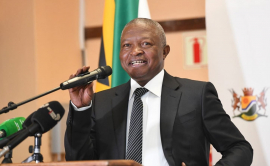
Government has vowed to continuously work with traditional leaders to find solutions to problems that affect rural areas.
“The ongoing interactions between government and traditional leaders in efforts to address obstacles that limit development in rural communities have highlighted the need for a closer working partnership between government and traditional leaders at all levels,” Deputy President David Mabuza said on Friday.
Mabuza was talking with traditional and Khoi-San leaders in Mpumalanga, in his capacity chairperson of the Inter-Ministerial Task Team.
“As we move along the development path, we need to make sure the decisions we take today and beyond are put into action.”
He highlighted unemployment, HIV/AIDS and TB, inequality and lack of water for homes and farming as some of the challenges facing rural communities.
Infrastructure
“We must also address the issue of limited access to information and communication technology services in rural communities,” said Mabuza.
To achieve this, the Deputy President believes that intentional and targeted investments in rural infrastructure networks are required.
According to Mabuza, the move will provide people with access to clean water and sanitation, electricity, and roads that link them to places of employment, schools, and hospitals.
“While the government is making progress on resolving some of the concerns, there are still issues that are in the process of being reviewed and processed.”
Government, he said, is committed to responding quickly to any concerns to find sustainable solutions.
Social ills
As part of this commitment, the President set up the Inter-Ministerial Task Team, led by the Deputy President, with a mandate to coordinate government's response to the problems traditional leaders face across the country.
Mabuza has described traditional leadership, as an institution located in the rural areas to play in collaborating with government to resolve these challenges, including social ills of gender-based violence, child abuse, crime, substance abuse and others.
“As traditional leaders, you should promote democratic governance and the values of an open and democratic society; progressively advance gender equality within the institutions of traditional leadership, and promote freedom and human dignity.”
He also acknowledged the challenges that the traditional and Khoi-San leaders are facing.
“We have also been criticised for taking too long to put in place measures to help the traditional communities address your challenges. We admit that we might not have acted quickly enough on some of the issues you have raised.”
He said he had heard the demand to accelerate the execution of the necessary measures so that rural areas can catch up to the rest of the nation in terms of development.
Land
“Regarding land tenure and administration, we are all aware that this is a complicated subject for those who reside in or seek to invest in traditional regions,” said Mabuza.
He said the issue was top of the agenda at the Communal Land Administration and Tenure Reform Summit in May this year.
“The summit was successful in adopting resolutions that will go a long way towards the development of appropriate land reform legislation and policies.
“We will continue to strive to achieve the development and sustainability of rural communities by ensuring that land rights are provided and that ownership is transferred from the state to rightful owners.”
In addition, Mabuza said they would focus more on improving inclusive land use management, building infrastructure, and providing targeted aid to rural populations.
“It is critical to prioritise access to land as a crucial asset for rural development and economic transformation, so that the land held in trust by traditional and Khoi-San leaders may be effectively used for agricultural, human settlements, and industrial development.”
Together with these leaders, government said it will sure that ordinary people benefit from commercial land use and the extraction of natural resources in traditional communities. – SAnews.gov.za


